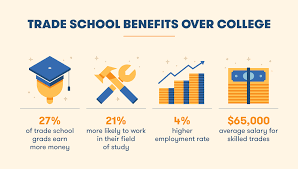Bestcolleges.com and Trade Schools.net provided some interesting & helpful information on the value of technical schools versus college.
- Entering a trade offers personal fulfillment, high salary potential, and job stability.
- Trade & Technical schools generally cost less and take less time than four-year college degrees.
- Trades are in high demand.
Every year, millions of high school seniors apply to college, but a good fraction of these students may not feel that a four-year degree is right for them. Even if they end up going to a traditional university and landing a stable job, they may find themselves in a career that isn’t personally fulfilling. Trade schools, also known as vocational schools or technical colleges — teach hands-on skills for specific careers.
Trade schools also offer a shorter timeline to employment & income than most educational paths. Bachelor’s degrees take four years or more to earn while many vocational certificates can be achieved in a year or less. The stability of the skilled trades is another benefit. With a vocation, you can respond to a real and constant need. The results-driven, hands-on work of these positions contrasts with many white-collar jobs that some come to find lack purpose & meaning. Studies show that general happiness is influenced more dramatically by satisfaction with one’s work life than income. The demand for trade & vocational skills keeps wages high, but the greatest value of learning a trade might be embarking on an enriching career.
- Program content: Four-year bachelor’s degree programs include general education classes that are not related to your chosen career field. Vocational schools focus on highly related topics which result in completing your training in approximately half the time.
- Outcomes: Vocational schools offer licensure, certificate, and diplomas, that typically take anywhere from a few months to two years to complete. Traditional colleges focus on bachelor’s, master’s, and other postgraduate programs.
- Class sizes: Many universities have large lecture halls that hold hundreds of students. Vocational schools, on the other hand, offer small class sizes. A smaller ratio of students to teacher is beneficial if you would like to get to know your instructor and receive personal attention.
- Hands-on training: While you might find some hands-on training opportunities with traditional colleges, the focus of those institutions is more academic.
- Externships: Many vocational schools build externships into their programs, which is one more way to receive relevant industry-focused training.
- Employer connections: It is common for technical schools to have relationships with many local employers. By maintaining an extensive employer network, your school can make it easier for you to enter the job market and help you find a position after graduation.
- Job security: The types of jobs that vocational schools can help prepare you for are often in high demand and have less chance of being relocated overseas. Many trade schools focus on offering programs for in-demand careers and helping students quickly enter the workforce.
For more information about Southeastern Technical Institute’s career programs & training click on ‘Programs’ in the above menu!

